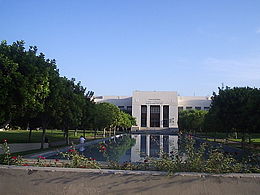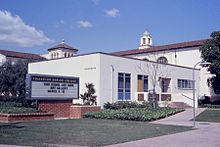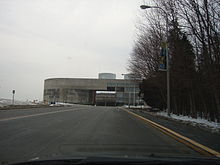- Community college
-
For the station in Boston, see Community College (MBTA station).
 Pasadena City College (PCC)
Pasadena City College (PCC)
A community college is a type of educational institution. The term can have different meanings in different countries.
Contents
Australia
Community colleges carry on the tradition of adult education, which was established in Australia around mid 19th centrury when evening classes were held to help adults enhance their numeracy and literacy skills.[1] Today, courses are designed for personal development of an individual and/or for employment outcomes. The educational program covers a variety of topics such as arts, languages, business and lifestyle; and are usually timetabled to be conducted in the evenings or weekends to accommodate people working full-time. Funding for community colleges may come from government grants and course fees; and most community colleges are not-for-profit organisations. There are community colleges located in metropolitan, regional and rural locations of Australia.
Learning offered by community colleges has changed over the years. By the 1980s many colleges had recognised a community need for computer training and since then thousands of people have been up-skilled through IT courses. The majority of colleges by the late 20th century had also become Registered Training Organisations; recognising the need to offer individuals a nurturing, non-traditional education venue to gain skills that would better prepare them for the workplace and potential job openings.[2] Qualifications such as undergraduate degrees and higher are not offered at community colleges, though some community colleges do offer certificate courses I to IV.
Canada
Main article: College (Canada)In Canada, the 150 institutions that are the rough equivalent (or much higher) of the US community college are usually referred to simply as "colleges" since in common usage a degree granting institution used to be almost exclusively a university. In the province of Quebec, even when speaking in English, colleges are called Cégeps for Collège d'enseignement général et professionnel, meaning "College of General and Vocational Education". (The word College can also refer to a private High School in Quebec).
Colleges are educational institutions providing higher education and tertiary education, granting certificates, diplomas, associate's degrees, and bachelor's degrees. Only in Western Canada is the term Associates degree used as in the United States. In other parts of Canada a degree is usually attained as a 4 year study program, and to a much lesser degree now, in 3 years
Each Province has its own Educational system reflecting the decentralization of the Canadian provinces and therefore of the Education system. However most of the colleges began in the mid-1960s as a response education and training for the then emerging baby boom generation, and to provide training to the post second World War II European immigrants and newer immigrants from around the world, that were starting to enter the country.
The motivation for community colleges was a new way of thinking about education and training in Canada (more specifically in Ontario), and was economically based as opposed to the much earlier start in the United States of Junior and Community Colleges which was driven by an integrative social policy. Some programs are still economically based, as to the needs of the area, province and country. All programs are reviewed regularly, or every few years for relevancy. Programs and courses are changed, added or deleted according to projected economic future, while many programs are relatively stable and have been around as long as the colleges, such as various business administration programs.
- Canadian Community College Systems
Malaysia
Main article: Community college (Malaysia)Community colleges in Malaysia are a network of educational institutions whereby vocational and technical skills training could be provided at all levels for school leavers before they entered the workforce. The community colleges also provide an infrastructure for rural communities to gain skills training through short courses as well as providing access to a post-secondary education.
At the moment, most community colleges award qualifications up to Level 3 in the Malaysian Qualifications Framework (Certificate 3) in both the Skills sector (Sijil Kemahiran Malaysia or the Malaysian Skills Certificate) as well as the Vocational and Training sector but the number of community colleges that are starting to award Level 4 qualifications (Diploma) are increasing. This is two levels below a Bachelor's degree (Level 6 in the MQF) and students within the system who intend to further their studies to that level will usually seek entry into Advanced Diploma programs in public universities, polytechnics or accredited private providers.
Philippines
In the Philippines, a community school functions as elementary or secondary school at daytime and towards the end of the day convert into a community college. This type of institution offers night classes under the supervision of the same principal, and the same faculty members who are given part time college teaching load.[3]
The concept of community college dates back to the time of the former Minister of Education, Culture and Sports (MECS) that had under its wings the Bureaus of Elementary Education, Secondary Education, Higher Education and Vocational-Technical Education. MECS Secretary, Dr. Cecilio Putong, who in 1971 wrote that a community school is a school established in the community, by the community, and for the community itself. Dr. Pedro T. Orata of Pangasinan shared the same idea, hence the establishment of a Community College, now called the City College of Urdaneta.[3]
A community college like the one in Abuyog, Leyte can operate with only PHP 124,000 annual budget in a 2-storey structure housing more than 700 students.[3]
United Kingdom
In the United Kingdom, a community college is a school which not only provides education for the school age population (11-19) of the locality, but also additional services and education to adults and other members of the community.[4] This education includes but is not limited to sports, adult literacy and lifestyle education.
United States
Main article: Community colleges in the United States Fullerton College the oldest community college (originally "Junior College") in continuous operation in California, having been established in 1913
Fullerton College the oldest community college (originally "Junior College") in continuous operation in California, having been established in 1913 Community College of Rhode Island, the largest community college in New England at a student population of approx. 17,000 was established in 1964
Community College of Rhode Island, the largest community college in New England at a student population of approx. 17,000 was established in 1964
In the United States, community colleges, sometimes called junior colleges, technical colleges, or city colleges, are primarily two-year public institutions providing higher education and lower-level tertiary education, granting certificates, diplomas, and associate's degrees.
After graduating from a community college, some students transfer to a four-year liberal arts college or university for two to three years to complete a bachelor's degree.
Before the 1970s, community colleges in the United States were more commonly referred to as junior colleges, and that term is still used at some institutions. However, the term "junior college" has evolved to describe private two-year institutions, whereas the term "community college" has evolved to describe publicly funded two-year institutions. The name derives from the fact that community colleges primarily attract and accept students from the local community, and are often supported by local tax revenue.
Comprehensive community colleges
Many schools have evolved into and adapted the term comprehensive to describe their institutions. These schools typically offer five facets of education.
- Transfer education – The traditional two-year student that will then transfer to a four-year institution to pursue a BS/BA degree.
- Career education – The traditional two-year student that will graduate with an Associate Degree and directly enter the workforce.
- Developmental – Remedial education for high school graduates who are not academically ready to enroll in college-level courses.
- Continuing – Non-Credit courses offered to the community for personal development and interest.
- Industry training – Contracted training and education wherein a local company pays the college to provide specific training or courses for their employees.
Within the transfer education category, comprehensive schools typically have articulation agreements in place that provide prearranged acceptance into specific four-year institutions. At some community colleges, the partnering four-year institution teaches the third and fourth year courses at the community college location and thereby allows a student to obtain a four year degree without having to physically move to the four-year school.
There are a number of institutions and organizations which provide community college research to inform practice and policy.
For background on U.S. community college libraries, see "Disposed to Consolidation and Innovation: Criteria for the Community College Specialization."[5]
Research
There are a number of research organizations and publications who focus upon the activities of community college, junior college, and technical college institutions.[6] Many of these institutions and organizations present the most current research and practical outcomes at annual community college conferences.
- The American Association of Community Colleges[7][8] has provided oversight on community college research since the 1920s.[9] AACC publishes a research journal called the Community College Journal.[10]
- The mission of the Community College Research Center[6][11] from Teachers College at Columbia University is to "conduct research on the major issues affecting community colleges in the United States and to contribute to the development of practice and policy that expands access to higher education and promotes success for all students."[12]
- The Center for Community College Student Engagement at the University of Texas at Austin administers surveys and provides data analysis support to member colleges regarding various factors of student engagement and involvement in community colleges in the United States and Canada.[13]
- The Community College Futures Assembly is an annual conference to showcase the best practices in community college administration. Focus groups convene at the conference to serve as a "think tank" to inform practice of community college board of trustees, presidents, and policy makers.[14]
Additionally, several peer-reviewed journals extensively publish research on community colleges:
- Community College Journal of Research and Practice
- New Directions for Community Colleges
- Community College Review
- The Kellogg Community College Leadership Legacy Project, researching and reporting on the success of those bringing leadership to Community Colleges and who were supported in their doctoral programs by grants by the W.K. Kellogg Foundation.
- Journal of Applied Research in the Community College
See also
- Articulation (education)
- Distance learning
- E-learning
- Lifelong learning
- In Australia
- Technical and Further Education
- Workers' Educational Association also in the UK
- In the Philippines
- In the UK
Notes
- ^ http://www.ace.nsw.gov.au/page.asp?PID=115&MID=1&SID=115
- ^ http://www.cca.edu.au/page/history.html
- ^ a b c Danao, Dr. Carolina P. (2005-02-20). "The medium-term higher education development plan and the local colleges and universities". The Manila Bulletin Online. Archived from the original on 2005-02-20. http://www.mb.com.ph/issues/2005/02/20/OPED2005022029090.html. Retrieved 2008-08-19.
- ^ http://dictionary.cambridge.org/dictionary/british/community-college
- ^ Kathleen M.Heim, "Disposed to Consolidation and Innovation: Criteria for the Community College Specialization." Community and Junior College Libraries 3 (Summer 1985): 5-15.
- ^ a b Mellow, G.O. & Heelan, C. (2008). Minding the Dream: The Process and Practice of the American Community College. New York: Rowman & Littlefield. ISBN 978-0-7425-6292
- ^ Cohen, A.M. & Brawer, F.B. (2008). The American Community College (5th Ed.). San Francisco: Jossey-Bass. ISBN 978-0-470-17468-5
- ^ Vaughn, G.B. (2000). The Community College Story. Community College Press. ISBN 0-87117323-9
- ^ Geller, H.A. (2001). A brief history of community colleges and a personal view of some issues (open admissions, occupational training and leadership). http://www.eric.ed.gov/ERICWebPortal/contentdelivery/servlet/ERICServlet?accno=ED459881
- ^ http://www.gseis.ucla.edu/ccs/journals.htm
- ^ Learning Matters-Discounted Dreams
- ^ Community College Research Center
- ^ Community College Student Survey of Student Engagement
- ^ Office of Community College Research and Leadership
References
- Baker, G. A. III (1994). A handbook on the community college in America: Its history, mission, and management. Westport, CT: Greenwood Press.
- Cohen, A.M., Brawer, F.B. (2003) The American Community College, 4th edition. San Francisco: Jossey Bass.
- Dougherty, K. J. (1994). The contradictory college: The conflicting origins, impacts, and futures of the community college. Albany, NY: State University of New York Press.
- Floyd, D.L., Skolnik, M.L., & Walker, K.P., eds. (2005). The Community College Baccalaureate: Emerging Trends and Policy Issues. Sterling VA: Stylus Publishing.
- Frye, J. H. (1992). The vision of the public junior college, 1900-1940. Westport, CT: Greenwood Press.
- Kasper, H.T. (2002). The changing role of community college. Occupational Outlook Quarterly, 46(4), 14–21.
- Murray, J.P. (2002). The current state of faculty development in two-year colleges. New Directions for Community Colleges, 118, 89–97.
- Vaughan, George, Mellander, Gustavo, Beverly Blois (1997). The Community College Presidency. Washington,DC: The American Association of Community Coolleges.
External links
Schools by educational stage Academy · College · Community college · Graduate school · Institute of technology · Junior college · University · Upper division college · Vocational universityby funding / eligibility Academy (England) · Charter school · Comprehensive school · For-profit education · Free education · Free school (England) · Independent school · Independent school (United Kingdom) · Preparatory school (United Kingdom) · Private school · Selective school · State or public schoolby style of education Adult education · Alternative school · Boarding school · Day school · Folk high school · Free skool · Homeschool · International school · K-12 · Madrasah · Magnet school · Montessori school · Parochial school · Virtual schoolby scope Categories:- Community colleges
- Types of university or college
- Vocational education
Wikimedia Foundation. 2010.


